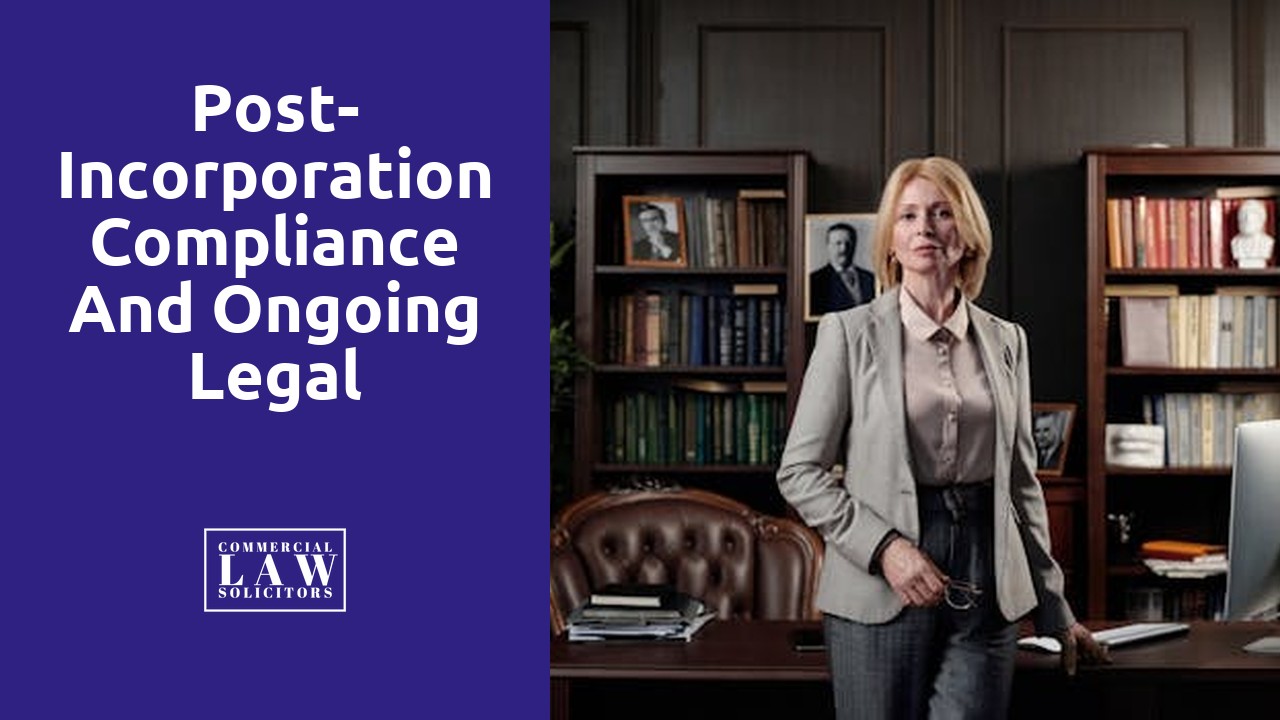Post-Incorporation Compliance and Ongoing Legal Obligations
Navigating the Complex World of Tax Law: Finding the Perfect Legal Partner Navigating the complex world of tax law can be a daunting task for any business. With constantly changing regulations and intricate legal requirements, it is essential to find the perfect legal partner who can guide you through the intricacies of tax law. Whether you are a small startup or a large corporation, having a knowledgeable and experienced tax law specialist by your side can make all the difference. When searching for the ideal legal partner to navigate the complexities of tax law, there are a few key factors to consider. First and foremost, expertise in tax law is non-negotiable. Look for a legal partner who specializes in tax law and has a deep understanding of the latest tax regulations and practices. Additionally, it is important to find a partner who has experience working with businesses similar to yours. This industry-specific expertise can provide valuable insights and tailored solutions to your unique tax challenges. By finding the perfect legal partner, you can navigate the intricate world of tax law with confidence and ensure that your business remains compliant and optimized for success.
From Legal Jargon to Practical Solutions: Hiring Commercial Solicitors for Tax Law MattersNavigating compliance requirements after incorporation can be a challenging task for businesses, especially with the ever-evolving legal landscape. It is crucial for companies to understand and fulfill their legal obligations to avoid potential penalties or legal actions. One of the key aspects of compliance is ensuring that the company is operating within the framework of applicable laws and regulations.
Firstly, it's important to look for solicitors who specialize in tax law. Tax rA vital aspect of running a successful business is staying on top of post-incorporation regulatory compliance. Once a company is incorporated, it becomes subject to various legal obligations and requirements. Ignoring or neglecting these responsibilities can have severe consequences, including fines, legal disputes, and even the dissolution of the business itself. Therefore, it is crucial for all businesses, regardless of their size or industry, to understand and adhere to the regulatory framework that governs their operations.egulations and guidelines are constantly changing, so you need a legal partner who is up-to-date with the latest developments. Look for solicitors with a proven track record in handling tax law cases and a deep understanding of the intricacies of the field. They should have extensive experience in advising businesses on tax planning, compliance, and dispute resolution. By choosing a specialist in tax law, you can ensure that your business receives the highest level of expertise and the most effective strategies to navigate complex tax matters.
Post-incorporation regulatory compliance encompasses a wide range of areas, including labor laws, tax regulations, environmental regulations, and consumer protection laws, among others. Each of these areas has its own set of rules and requirements that businesses must follow. Failure to comply with any of these regulations can not only tarnish a company's reputation but also lead to significant financial and legal repercussions. It is therefore imperative for businesses to thoroughly understand the specific compliance obligations that apply to them and take the necessary steps to ensure ongoing compliance.Maximizing Your Business Potential: The Role of Commercial Solicitors in Tax Law
Unraveling the Legal Maze: Meeting Ongoing ObligationsCommercial solicitors play a vital role in maximizing the business potential of companies when it comes to tax law matters. With the complex and ever-changing nature of tax regulations, having a legal partner who specializes in this field is crucial. These professionals possess the expertise and knowledge to guide businesses through the intricate maze of tax laws, ensuring compliance and optimizing financial outcomes.
Meeting ongoing obligations is a critical aspect of navigating the legal maze after incorporation. Once a company is established, it must adhere to various compliance requirements to ensure it operates within the confines of the law. This involves fulfilling legal obligations, such as filing annual reports, maintaining accurate records, and paying taxes in a timely manner. Failure to meet these obligations can result in severe consequences, including penalties, fines, or even legal action. Therefore, it is essential for companies to have a robust system in place to monitor and address their ongoing compliance responsibilities to avoid any potential setbacks or risks.One of the key advantages of engaging commercial solicitors for tax law is their ability to provide practical solutions. Tax regulations can be convoluted, filled with legal jargon that can be challenging for businesses to decipher. However, experienced solicitors can translate these complexities into actionable strategies that align with a company's goals. Whether it's advising on tax planning, addressing compliance issues, or representing businesses in tax disputes, these specialists offer practical solutions tailored to maximize business potential.
To effectively unravel the legal maze and meet ongoing obligations, businesses must adopt a proactive approach. This includes staying updated with any changes in legislation that may impact their operations. By regularly reviewing and understanding the legal landscape, companies can identify and address any new compliance requirements promptly. Additionally, establishing internal controls and processes to monitor compliance is crucial. This can involve appointing a dedicated compliance officer or team, implementing compliance training for employees, and conducting regular audits to ensure all obligations are met. By taking these proactive measures, businesses can navigate the legal maze with confidence and ensure ongoing compliance, positioning themselves for long-term success.
Essential Compliance Practices for Incorporated Companies
Advantages of Professional Legal Assistance in Incorporation
Role of Commercial Solicitors in Company Formation
Incorporation Documents and Paperwork